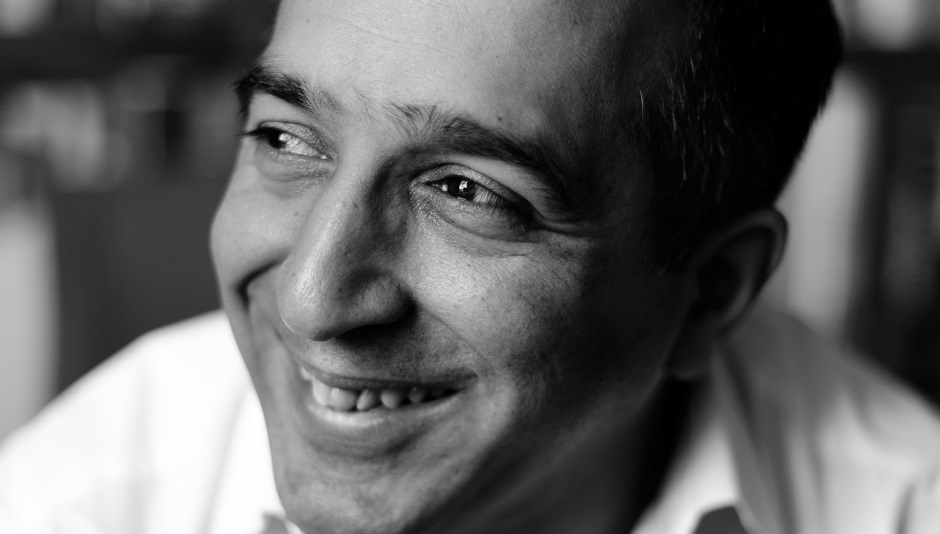Sam Guglani is a poet, novelist and consultant oncologist who specialises in the management of lung and brain tumours. He has a background in medical ethics and chairs the Gloucestershire Hospitals Trust law and ethics group. Director of Medicine Unboxed since he founded it in 2009, Sam uses the arts and creative industries to illuminate challenges in medicine. He is a published poet and writes for The Lancet, and his debut novel Histories is released in 2017.
On Sunday, 5th November Sam will speak about his work as part of our Hearth festival. What are the human and moral challenges of contemporary medicine? Why are the arts an urgent and necessary means of knowledge towards better medicine – and ultimately, better society?
Before his event, we spoke to Sam to find out more…
Your talk will address the human and moral challenges of contemporary medicine, and why the arts are an urgent and necessary means of knowledge towards, ultimately, a better society. So, not much to cover! Can you give me a glimpse of what guests can expect from this hour?
Illness, suffering and mortality are inescapable human realities. But our desire for certainty and an increasingly consumer sense of entitlement – premised on the real achievements of scientific progress – distort our relationship to these realities within what’s still a contingent world. This has consequences for how we live and die, for medicine, social justice and the wellbeing of the planet. The arts – though by no means a panacea – are a means of knowledge and enquiry by which we might realign ourselves to these realities, begin to identify with others’ experience and interrogate sometimes fixed moral perspectives.
Your debut fiction, Histories, is published just before the festival. Fiction is not, predominantly, your background – can you tell me a little about why you felt compelled to write this book?
Writing is a way of probing the world, of constructing and finding meaning. In this sense, both writing and medicine feel similar – a process of excavating meaning from the hard, thin surface of the world.
Histories takes place over just one week. Why this short time frame?
‘Every moment is a new and shocking / Valuation of all we have been.’ – Eliot
What is the best sentence from the book?
If there is one, I oughtn’t to be the judge of it.
How have you found entering the world of writing and its expectations (signings, talks etc.) – has anything from your career equipped you for this?
A little. So much of medicine is a kind of performance. If anything, writing and its expectations feel more exposing / unsettling / tectonic.
You are also Director and Curator of Medicine Unboxed, a project which engages health professionals and the public in conversation around medicine, illuminated through the arts. Can you tell me some of the highlights of this project and its achievements?
Medicine Unboxed began life nine years ago as a project to enquire around medicine’s encounter with humanity, and to assert the need for knowledge that’s wider than the simply scientific. Our annual events – Values 2011, Belief 2012, Voice 2013, Frontiers 2014, Mortality 2015, Wonder 2016 – draw sell-out, mixed healthcare / public audiences of around three hundred people.Our speakers include writers, performers, philosophers, politicians, poets, historians and musicians; contributors include: James Rhodes, Jackie Kay, Claire Short, Lionel Shriver, Laurence Rees, Max Porter, Raymond Tallis, Jo Shapcott, David Mitchell and Richard Holloway. We also hold numerous satellite collaborations and a national student symposium. It’s been extraordinary to witness it grow, and personally rewarding to draw such astonishing speakers and watch conversations flourish. Our event this year is themed MAPS and will be held 25th – 26th November at Parabola Arts Centre in Cheltenham.
Find out more about Medicine Unboxed on SoundCloud, Vimeo, Facebook and Twitter.
There is a really lovely quote from Michel Faber who says ‘Some will describe him as a doctor-turned-writer. On the evidence of this remarkable debut, I would say he’s a writer who also happens to be a doctor.’ Which would you consider to be closest to the truth?
I’m not sure. I’m probably just a person who’s driven, by the same impulse, towards both.
What are you hoping to find at Gladstone’s Library?
I’ve previously found it a very special place of retreat. I hope for that again, but am looking forward to the conversation around my talk and others’.
What are you hoping people will bring to your talk and what will they take away?
I’m often asked what outcome I hope for from Medicine Unboxed. And the answer is always just this: the conversation. The same is true for this event. Maybe that’s selfish, but maybe that’s all that writing ever is: the hope of dialogue, of connection, sometimes even the realisation of it, and how this ignites change.
Sam’s talk at Hearth, Medicine, Science and the Arts, takes place at 10.15am on Sunday, 5th November. Tickets are priced at £14. To book tickets you can book online, call 01244 532350 or email [email protected].
